List of governors of Delaware
 From Wikipedia - Reading time: 22 min
From Wikipedia - Reading time: 22 min
| Governor of Delaware | |
|---|---|
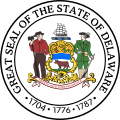 | |
since January 21, 2025 | |
| Government of Delaware | |
| Style | The Honorable |
| Residence | Delaware Governor's Mansion Dover, Delaware |
| Term length | Four years, renewable once |
| Inaugural holder | John McKinly |
| Formation | February 12, 1777 |
| Succession | Line of succession |
| Deputy | Lieutenant Governor of Delaware |
| Salary | $171,000 (2013)[1] |
| Website | governor |
The governor of Delaware (known as the president of Delaware from 1776 to 1792) is the head of government of Delaware and the commander-in-chief of the state's military forces. The governor has a duty to enforce state laws, and the power to either approve or veto bills passed by the Delaware Legislature, to convene the legislature,[2] and to grant pardons, except in cases of impeachment, and only with the recommendation of the Board of Pardons.[3]
There have been 71 people who have served as governor, over 74 distinct terms. Three (Joseph Haslet, Charles Polk Jr. and Elbert N. Carvel) served non-consecutive terms. Additionally, Henry Molleston was elected, but died before he could take office. Only four governors have been elected to two consecutive terms, with the longest-serving being Ruth Ann Minner, who was elected twice after succeeding to the office, serving a total of just over eight years. The shortest term is that of Bethany Hall-Long, who served 15 days following her predecessor's resignation; Dale E. Wolf served 18 days and David P. Buckson served 19 days under similar circumstances. The current governor is Democrat Matt Meyer, who took office on January 21, 2025.
Governors
[edit]Before 1776, Delaware was a colony of the Kingdom of Great Britain, administered by colonial governors in Pennsylvania as the "Lower Counties on Delaware".
In 1776, soon after Delaware and the other Thirteen Colonies declared independence from Britain, the state adopted its first state constitution. It created the office of President of Delaware, a chief executive to be chosen by the legislature to serve a term of three years, who would be ineligible to be president again until three years had passed after leaving office.[4]
The office of President was renamed Governor by the constitution of 1792,[5] which set the commencement date of the term to the third Tuesday in the January following an election, and limited governors to serving only three out of any six years.[6] The term was lengthened to four years by the 1831 constitution, but governors were limited to a single term.[7] The current constitution of 1897 allows governors to serve two terms.[8]
The 1776 constitution stated that if the presidency were vacant, the speaker of the legislative council would be a vice-president.[9] The 1792 constitution has the speaker of the senate exercising the office when it is vacant, and the 1897 constitution created the office of lieutenant governor,[10] upon whom the office devolves in case of vacancy.[11] The offices of governor and lieutenant governor are elected at the same time but not on the same ticket.
| No.[a] | Governor[b] | Term in office | Party | Election | Lt. Governor[c][d] | |||
|---|---|---|---|---|---|---|---|---|
| 1 | 
|
John McKinly (1721–1796) [13][14][15] |
February 21, 1777[16] – September 12, 1777[e] (arrested and removed)[f] |
No parties | 1777 | Office did not exist | ||
| 2 | 
|
Thomas McKean (1734–1817) [20][14][21] |
September 12, 1777[22] – October 20, 1777 (successor took office) |
Speaker of the Assembly acting as vice-president[g] | ||||
| 3 | 
|
George Read (1733–1798) [24][14][25] |
October 20, 1777[22] – March 31, 1778 (did not run) |
Speaker of the Legislative Council serving as vice-president[g] | ||||
| 4 | 
|
Caesar Rodney (1728–1784) [26][14][27] |
March 31, 1778[22] – November 13, 1781[h] (term-limited)[i] |
1778 | ||||
| 5 | 
|
John Dickinson (1732–1808) [29][14][30] |
November 13, 1781[j] – January 13, 1783 (resigned)[k] |
1781 | ||||
| 6 | 
|
John Cook (1730–1789) [34][14][35] |
January 13, 1783[33] – February 8, 1783 (did not run) |
Speaker of the Legislative Council serving as vice-president | ||||
| 7 | 
|
Nicholas Van Dyke (1738–1789) [36][14][37] |
February 8, 1783[38] – October 28, 1786 (term-limited)[i] |
1783 (special) | ||||
| 8 | 
|
Thomas Collins (1732–1789) [39][40][41] |
October 28, 1786[42] – March 29, 1789 (died in office) |
1786 | ||||
| 9 | 
|
Jehu Davis (1738–1802) [43][44][45] |
March 29, 1789[22] – June 2, 1789 (did not run) |
Speaker of the Legislative Council serving as vice-president | ||||
| 10 | 
|
Joshua Clayton (1744–1798) [46][47][44][48] |
June 2, 1789[49] – January 13, 1796 (term-limited)[l][m] |
Federalist[52] | 1789 | |||
| 1792 | ||||||||
| 11 | 
|
Gunning Bedford Sr. (1742–1797) [53][54][44][55] |
January 13, 1796[22] – September 28, 1797 (died in office)[n] |
Federalist[57] | 1795 | |||
| 12 | 
|
Daniel Rogers (1754–1806) [58][59][44][56] |
September 28, 1797[n] – January 9, 1799 (successor took office) |
Federalist[52] | Speaker of the Senate acting | |||
| 13 | 
|
Richard Bassett (1745–1815) [60][61][44][62] |
January 9, 1799[o] – March 3, 1801 (resigned)[p] |
Federalist[57] | 1798 | |||
| 14 | 
|
James Sykes (1761–1822) [65][66][44][63] |
March 3, 1801[22] – January 19, 1802 (successor took office) |
Federalist[52] | Speaker of the Senate acting | |||
| 15 | 
|
David Hall (1752–1817) [67][68][69][70] |
January 19, 1802[71] – January 15, 1805 (term-limited)[m] |
Democratic- Republican[57] |
1801 | |||
| 16 | 
|
Nathaniel Mitchell (1753–1814) [72][73][74][75] |
January 15, 1805[76] – January 19, 1808 (term-limited)[m] |
Federalist[57] | 1804 | |||
| 17 | 
|
George Truitt (1756–1818) [77][78][74][79] |
January 19, 1808[80] – January 15, 1811 (term-limited)[m] |
Federalist[57] | 1807 | |||
| 18 | 
|
Joseph Haslet (1769–1823) [81][82][74][83] |
January 15, 1811[84] – January 18, 1814 (term-limited)[m] |
Democratic- Republican[57] |
1810 | |||
| 19 | 
|
Daniel Rodney (1764–1846) [85][86][74][83] |
January 18, 1814[87] – January 21, 1817 (term-limited)[m] |
Federalist[57] | 1813 | |||
| 20 | 
|
John Clark (1761–1821) [88][89][74][90] |
January 21, 1817[91] – January 15, 1820 (resigned)[q] |
Federalist[94] | 1816 | |||
| — | 
|
Henry Molleston (1762–1819) [88][74] |
Died before taking office[q] |
Federalist[94] | 1819 | |||
| 21 | 
|
Jacob Stout (1764–1855) [95][96][74][97] |
January 15, 1820[92] – January 16, 1821 (successor took office) |
Federalist[95] | Speaker of the Senate acting | |||
| 22 | 
|
John Collins (1776–1822) [98][99][74][100] |
January 16, 1821[101] – April 16, 1822 (died in office) |
Democratic- Republican[94] |
1820 (special)[r] | |||
| 23 | 
|
Caleb Rodney (1767–1840) [102][103][74][100] |
April 23, 1822[104] – January 21, 1823 (did not run) |
Federalist[52] | Speaker of the Senate acting | |||
| 24 | 
|
Joseph Haslet (1769–1823) [81][82][74][100] |
January 21, 1823[s] – June 20, 1823 (died in office) |
Democratic- Republican[94] |
1822 | |||
| 25 | 
|
Charles Thomas (1790–1848) [106][107][74][108] |
June 20, 1823[t] – January 20, 1824 (successor took office) |
Democratic- Republican[52] |
Speaker of the Senate acting | |||
| 26 | 
|
Samuel Paynter (1768–1845) [106][111][74][112] |
January 20, 1824[113] – January 16, 1827 (term-limited)[m] |
Federalist[94] | 1823 (special)[u] | |||
| 27 | 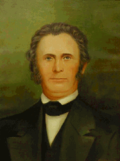
|
Charles Polk Jr. (1788–1857) [114][115][116][117] |
January 16, 1827[118] – January 19, 1830 (term-limited)[m] |
Federalist[94] | 1826 | |||
| 28 | 
|
David Hazzard (1781–1864) [119][120][121][122] |
January 19, 1830[123] – January 15, 1833 (term-limited)[v] |
National Republican[94] |
1829 | |||
| 29 | 
|
Caleb P. Bennett (1758–1836) [125][126][121][127] |
January 15, 1833[128] – May 9, 1836 (died in office) |
Democratic[94] | 1832[w] | |||
| 30 | 
|
Charles Polk Jr. (1788–1857) [114][115][121][129] |
May 9, 1836[130] – January 17, 1837 (successor took office) |
Whig[52] | Speaker of the Senate acting | |||
| 31 | 
|
Cornelius P. Comegys (1780–1851) [131][132][121][133] |
January 17, 1837[134] – January 19, 1841 (term-limited)[v] |
Whig[94] | 1836 | |||
| 32 | 
|
William B. Cooper (1771–1849) [135][136][121][137] |
January 19, 1841[138] – January 21, 1845 (term-limited)[v] |
Whig[94] | 1840 | |||
| 33 | 
|
Thomas Stockton (1781–1846) [139][140][141][142] |
January 21, 1845[143] – March 2, 1846 (died in office) |
Whig[94] | 1844 | |||
| 34 | 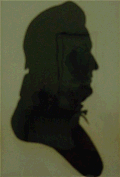
|
Joseph Maull (1781–1846) [144][145][146][147] |
March 2, 1846[148] – May 3, 1846 (died in office) |
Whig[52] | Speaker of the Senate acting | |||
| 35 | 
|
William Temple (1814–1863) [149][150][146][151] |
May 6, 1846[152] – January 19, 1847 (successor took office) |
Whig[52] | Speaker of the Senate acting | |||
| 36 | 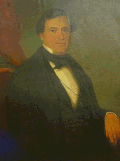
|
William Tharp (1803–1865) [153][154][146][155] |
January 19, 1847[156] – January 21, 1851 (term-limited)[v] |
Democratic[157] | 1846 (special)[x] | |||
| 37 | 
|
William H. H. Ross (1814–1887) [158][159][146][160] |
January 21, 1851[161] – January 16, 1855 (term-limited)[v] |
Democratic[157] | 1850 | |||
| 38 | 
|
Peter F. Causey (1801–1871) [162][163][146][164] |
January 16, 1855[165] – January 18, 1859 (term-limited)[v] |
American[157] | 1854 | |||
| 39 | 
|
William Burton (1789–1866) [166][167][146][168] |
January 18, 1859[169] – January 20, 1863 (term-limited)[v] |
Democratic[157] | 1858 | |||
| 40 | 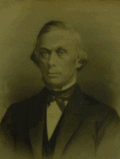
|
William Cannon (1809–1865) [170][171][146][172] |
January 20, 1863[173] – March 1, 1865 (died in office) |
Republican[52] | 1862 | |||
| 41 | 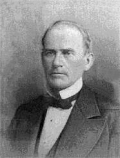
|
Gove Saulsbury (1815–1881) [174][175][146][176] |
March 1, 1865[177] – January 17, 1871 (term-limited)[v] |
Democratic[52] | Speaker of the Senate acting | |||
| 1866 | ||||||||
| 42 | 
|
James Ponder (1819–1897) [178][179][180][181] |
January 17, 1871[182] – January 19, 1875 (term-limited)[v] |
Democratic[52] | 1870 | |||
| 43 | 
|
John P. Cochran (1809–1898) [183][184][180][185] |
January 19, 1875[186] – January 21, 1879 (term-limited)[v] |
Democratic[52] | 1874 | |||
| 44 | 
|
John W. Hall (1817–1892) [187][188][180][189] |
January 21, 1879[190] – January 16, 1883 (term-limited)[v] |
Democratic[52] | 1878 | |||
| 45 | 
|
Charles C. Stockley (1819–1901) [191][192][180][193] |
January 16, 1883[194] – January 18, 1887 (term-limited)[v] |
Democratic[52] | 1882 | |||
| 46 | 
|
Benjamin T. Biggs (1821–1893) [195][196][180][197] |
January 18, 1887[198] – January 20, 1891 (term-limited)[v] |
Democratic[52] | 1886 | |||
| 47 | 
|
Robert J. Reynolds (1838–1909) [199][200][180][201] |
January 20, 1891[202] – January 15, 1895 (term-limited)[v] |
Democratic[52] | 1890 | |||
| 48 | 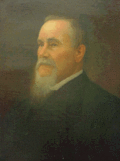
|
Joshua H. Marvil (1825–1895) [203][204][180][205] |
January 15, 1895[206] – April 8, 1895 (died in office) |
Republican[52] | 1894 | |||
| 49 | 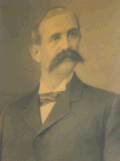
|
William T. Watson (1849–1917) [207][208][180][209] |
April 8, 1895[210] – January 19, 1897 (successor took office) |
Democratic[52] | Speaker of the Senate acting | |||
| 50 | 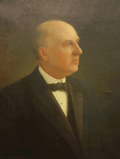
|
Ebe W. Tunnell (1844–1917) [211][212][180][213] |
January 19, 1897[214] – January 15, 1901 (did not run) |
Democratic[52] | 1896[y] | |||
| 51 | 
|
John Hunn (1849–1926) [216][217][218] |
January 15, 1901[219] – January 17, 1905 (did not run) |
Republican[50] | 1900 | Philip L. Cannon | ||
| 52 | 
|
Preston Lea (1841–1916) [220][221][222] |
January 17, 1905[223] – January 19, 1909 (did not run) |
Republican[50] | 1904 | Isaac T. Parker | ||
| 53 | 
|
Simeon S. Pennewill (1867–1935) [224][225] |
January 19, 1909[226] – January 21, 1913 (did not run) |
Republican[50] | 1908 | John M. Mendinhall | ||
| 54 | 
|
Charles R. Miller (1857–1927) [227][228] |
January 21, 1913[229] – January 16, 1917 (did not run)[227] |
Republican[227] | 1912 | Colen Ferguson[z] | ||
| 55 | 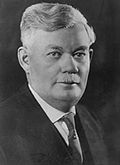
|
John G. Townsend Jr. (1871–1964) [230][231] |
January 16, 1917[232] – January 18, 1921 (did not run)[230] |
Republican[50] | 1916 | Lewis E. Eliason[z] | ||
| 56 | 
|
William D. Denney (1873–1953) [233][234] |
January 18, 1921[235] – January 20, 1925 (did not run) |
Republican[50] | 1920 | J. Danforth Bush | ||
| 57 | 
|
Robert P. Robinson (1869–1939) [236][237] |
January 20, 1925[238] – January 15, 1929 (did not run)[236] |
Republican[50] | 1924 | James H. Anderson | ||
| 58 | 
|
C. Douglass Buck (1890–1965) [239][240] |
January 15, 1929[241] – January 19, 1937 (term-limited)[aa] |
Republican[50] | 1928 | James H. Hazel | ||
| 1932 | Roy F. Corley | |||||||
| 59 | 
|
Richard McMullen (1868–1944) [243][244] |
January 19, 1937[245] – January 21, 1941 (did not run) |
Democratic[50] | 1936 | Edward W. Cooch | ||
| 60 | 
|
Walter W. Bacon (1880–1962) [246][247] |
January 21, 1941[248] – January 18, 1949 (term-limited)[aa] |
Republican[50] | 1940 | Isaac J. MacCollum[z] | ||
| 1944 | Elbert N. Carvel[z] | |||||||
| 61 | 
|
Elbert N. Carvel (1910–2005) [249][250] |
January 18, 1949[251] – January 20, 1953 (lost election) |
Democratic[50] | 1948 | Alexis I. du Pont Bayard | ||
| 62 | 
|
J. Caleb Boggs (1909–1993) [252][253] |
January 20, 1953[254] – December 30, 1960 (resigned)[ab] |
Republican[50] | 1952 | John W. Rollins | ||
| 1956 | David P. Buckson | |||||||
| 63 | 
|
David P. Buckson (1920–2017) [255][256] |
December 30, 1960[257] – January 17, 1961 (successor took office) |
Republican[50] | Succeeded from lieutenant governor |
Vacant | ||
| 64 | 
|
Elbert N. Carvel (1910–2005) [249][250] |
January 17, 1961[258] – January 19, 1965 (term-limited)[aa] |
Democratic[50] | 1960 | Eugene Lammot | ||
| 65 | 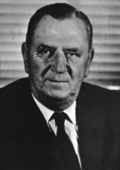
|
Charles L. Terry Jr. (1900–1970) [259][260] |
January 19, 1965[261] – January 21, 1969 (lost election) |
Democratic[50] | 1964 | Sherman W. Tribbitt | ||
| 66 | 
|
Russell W. Peterson (1916–2011) [262][263] |
January 21, 1969[264] – January 16, 1973 (lost election) |
Republican[50] | 1968 | Eugene Bookhammer[ac] | ||
| 67 | 
|
Sherman W. Tribbitt (1922–2010) [265][266] |
January 16, 1973[267] – January 18, 1977 (lost election) |
Democratic[50] | 1972 | |||
| 68 | 
|
Pete du Pont (1935–2021) [268][269] |
January 18, 1977[270] – January 15, 1985 (term-limited)[aa] |
Republican[269] | 1976 | James D. McGinnis[z] | ||
| 1980 | Mike Castle | |||||||
| 69 | 
|
Mike Castle (b. 1939) [271] |
January 15, 1985[272] – January 2, 1993 (resigned)[ad] |
Republican[271] | 1984 | Shien Biau Woo[z] | ||
| 1988 | Dale E. Wolf | |||||||
| 70 | 
|
Dale E. Wolf (1924–2021) [273] |
January 3, 1993[274] – January 19, 1993 (successor took office) |
Republican[273] | Succeeded from lieutenant governor |
Vacant | ||
| 71 | 
|
Tom Carper (b. 1947) [275] |
January 19, 1993[276] – January 3, 2001 (resigned)[ae] |
Democratic[275] | 1992 | Ruth Ann Minner | ||
| 1996 | ||||||||
| 72 | 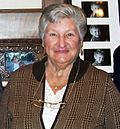
|
Ruth Ann Minner (1935–2021) [278] |
January 3, 2001[279] – January 20, 2009 (term-limited)[aa] |
Democratic[278] | Succeeded from lieutenant governor |
Vacant | ||
| 2000 | John Carney | |||||||
| 2004 | ||||||||
| 73 | 
|
Jack Markell (b. 1960) [280] |
January 20, 2009[281] – January 17, 2017 (term-limited)[aa] |
Democratic[280] | 2008 | Matthew Denn (resigned January 6, 2015) | ||
| 2012 | ||||||||
| Vacant | ||||||||
| 74 | 
|
John Carney (b. 1956) [282] |
January 17, 2017[283] – January 7, 2025 (resigned)[af] |
Democratic[282] | 2016 | Bethany Hall-Long | ||
| 2020 | ||||||||
| 75 | 
|
Bethany Hall-Long (b. 1963) [284] |
January 7, 2025[285] – January 21, 2025 (successor took office) |
Democratic[284] | Succeeded from lieutenant governor |
Vacant | ||
| 76 | 
|
Matt Meyer (b. 1971) [286] |
January 21, 2025[287] – Incumbent[ag] |
Democratic[286] | 2024 | Kyle Evans Gay | ||
See also
[edit]Notes
[edit]- ^ The official website labels John Carney as the 74th governor;[12] this indicates that repeat, non-consecutive terms are numbered.
- ^ The office was named president until 1792.[5]
- ^ The office of lieutenant governor was created in 1897,[10] with the first election taking place in 1900.
- ^ Lieutenant governors represented the same party as their governor unless noted.
- ^ Most sources do not specify the day McKinly was captured; at least one specifies that McKinly and the city of Wilmington were captured the day after the Battle of Brandywine, which was on September 11, 1777.[17]
- ^ McKinly was captured and taken prisoner by British forces.[18] He was exchanged for loyalist Governor William Franklin of New Jersey in August 1778.[19]
- ^ a b Speaker of the Assembly McKean acted as chief executive until the return of speaker of the Legislative Council Read from the Continental Congress in Philadelphia, who then served as vice-president for the remainder of the term.[23]
- ^ Kallenbach has Rodney leaving office on November 5, with a gap until Dickinson takes office, with no reason given.[22]
- ^ a b Under the 1776 constitution, presidents were ineligible to the office until three years had passed after leaving it.[28]
- ^ Sources disagree on when Dickinson took office; the proceedings of the assembly, published in 1988, says his inaugural address was delivered November 13;[31] the governor's register, published in 1926, says he was elected on November 13 and inaugurated on November 14.[32]
- ^ Dickinson was elected President of Pennsylvania and took office November 7, 1782, holding both presidencies simultaneously. Criticism of this caused him to turn administration of the state over to Speaker of the Legislative Council Cook, but Dickinson did not formally resign until January 13, 1783.[14][33]
- ^ Clayton's first term was as president, so he was eligible to run for a term as governor.[50]
- ^ a b c d e f g h Under the 1792 constitution, governors could serve no longer than three in any term of six years.[51]
- ^ a b Sources disagree on if Bedford died on September 28 or September 30, sometimes within the same source.[56]
- ^ The constitutional start date for the term in 1799 was January 15; multiple sources say Bassett took office January 9, but it is not known why it was off schedule.[22][63] A few sources do say he took office January 15.[64]
- ^ Bassett resigned, having been confirmed to the United States Third Circuit Court.[61]
- ^ a b Due to the death of Governor-elect Molleston, there was some question as to who should take office when Clark's term ended. To minimize any confusion, Clark resigned a few days ahead of schedule, and the newly elected state senate chose a speaker, John Stout, who would act as governor for one year of Molleston's term before a special election was held for the remaining two years.[92][93]
- ^ Special election to serve out the last two years of Henry Molleston's term[93]
- ^ The governor's register has Haslet being inaugurated on January 22, but it specifies the third Tuesday in January, which in 1823 was the 21st.[105]
- ^ Haslet died on June 20;[109] Thomas was not sworn in until June 24.[110]
- ^ Because of the death of Haslet so early in his term, an early election was called. Unlike when Henry Molleston died, where the election was only for the final two years of his term, in this case the new election was for a new three-year term, causing the election schedule to shift.[93]
- ^ a b c d e f g h i j k l m n Under the 1831 constitution, governors were not eligible a second time to the office.[124]
- ^ First term under the 1831 constitution, which lengthened terms to four years.[7]
- ^ Special election called due to the deaths of Stockton and Maull, causing a shift in the election schedule.[157]
- ^ Because Marvil died so early in his term, the General Assembly decided to conduct an election for a full term in 1896, changing the election schedule.[215]
- ^ a b c d e f Represented the Democratic Party
- ^ a b c d e f Under the 1897 constitution, governors were not eligible a third time to the office.[242]
- ^ Boggs resigned, having been elected to the United States Senate.[253]
- ^ Represented the Republican Party
- ^ Castle resigned, having been elected to the United States House of Representatives.[271]
- ^ Carper resigned, having been elected to the United States Senate.[277]
- ^ Carney resigned, having been elected mayor of Wilmington.
- ^ Meyer's term expires on January 16, 2029.
References
[edit]- General
- Martin, Roger A. (1984). A History of Delaware Through its Governors. Wilmington, DE: McClafferty Press.
- "Former Delaware Governors". National Governors Association. Retrieved July 10, 2019.
- Pickett, Russell S. "Delaware Governors". Retrieved October 25, 2009.
- Sobel, Robert (1978). Biographical directory of the governors of the United States, 1789–1978, Vol. I. Meckler Books. ISBN 978-0930466015. Retrieved July 10, 2019.
- Dubin, Michael J. (2003). United States Gubernatorial Elections, 1776-1860: The Official Results by State and County. McFarland. ISBN 978-0-7864-1439-0.
- Dubin, Michael J. (2014). United States Gubernatorial Elections, 1861-1911: The Official Results by State and County. McFarland. ISBN 978-0-7864-5646-8.
- Kallenbach, Joseph Ernest (1977). American State Governors, 1776-1976. Oceana Publications. ISBN 978-0-379-00665-0. Retrieved September 23, 2023.
- Glashan, Roy R. (1979). American Governors and Gubernatorial Elections, 1775-1978. Meckler Books. ISBN 978-0-930466-17-6.
- Biographical and Genealogical History of the State of Delaware. 1899. Retrieved February 17, 2023.
- Conrad, Henry Clay (1908). History of the State of Delaware, Volume 3. Retrieved February 17, 2023.
- Governor's Register, State of Delaware. Vol. 1. Public Archives Commission of Delaware. 1926. Retrieved September 26, 2023.
- "Our Campaigns - Governor of Delaware - History". www.ourcampaigns.com. Retrieved July 25, 2023.
- Constitutions
- "Constitution of the State of Delaware". State of Delaware. 1897. Retrieved December 21, 2022.
- Constitution of the State of Delaware (1831)[288]
- Constitution of the State of Delaware (1792)[289]
- "Constitution of the State of Delaware". Avalon Project. Yale Law School. 1776. Retrieved December 21, 2022.
- Specific
- ^ "CSG Releases 2013 Governor Salaries". The Council of State Governments. June 25, 2013. Retrieved November 23, 2014.
- ^ DE Const. art. III
- ^ DE Const. art. VII, § 1
- ^ 1776 Const. art 7
- ^ a b 1792 Const. art. III, § 1
- ^ 1792 Const. art. III, § 3
- ^ a b 1831 Const. art III, § 3
- ^ DE Const. art. III, § 5
- ^ 1776 Const. art. 7
- ^ a b DE Const. art. III, § 19
- ^ DE Const. art. III, § 20
- ^ "About Governor John Carney". Governor of Delaware. Retrieved November 16, 2018.
- ^ "John McKinly". National Governors Association. Retrieved February 17, 2023.
- ^ a b c d e f g h Biographical and Genealogical History 1899, p. 67.
- ^ Conrad 1908, p. 820.
- ^ Biographical and Genealogical History of the State of Delaware. 1899. p. 67.
- ^ Delaware Federal Writers' Project (1938). Delaware: A Guide to the First State. p. 48. ISBN 978-1-60354-008-7. Retrieved August 4, 2010.
- ^ McGuire, Thomas J. (2006). The Philadelphia Campaign. Mechanicsburg, Pennsylvania: Stackpole Books. p. 278. ISBN 0-8117-0206-5.
- ^ Rowe, Gail Stuart (1978). Thomas McKean: The Shaping of an American Republicanism. p. 147. ISBN 0-87081-100-2.
- ^ "Thomas McKean". National Governors Association. Retrieved February 17, 2023.
- ^ Conrad 1908, pp. 820–821.
- ^ a b c d e f g h Kallenbach 1977, pp. 112–115.
- ^ Conrad 1908, p. 821.
- ^ "George Read". National Governors Association. Retrieved February 17, 2023.
- ^ Conrad 1908, pp. 821–822.
- ^ "Caesar Rodney". National Governors Association. Retrieved February 17, 2023.
- ^ Conrad 1908, p. 822.
- ^ "1776 Del. Const. art. VII". www.stateconstitutions.umd.edu. Retrieved December 15, 2023.
- ^ "John Dickinson". National Governors Association. Retrieved February 17, 2023.
- ^ Conrad 1908, pp. 822–824.
- ^ Proceedings of the House of Assembly of the Delaware state, 1781-1792, and of the Constitutional Convention of 1792. Newark : University of Delaware Press ; London : Associated University Presses. 1988. p. 59. ISBN 978-0-87413-309-7.
- ^ Register 1926, p. 27.
- ^ a b Proceedings of the House of Assembly of the Delaware state, 1781-1792, and of the Constitutional Convention of 1792. Newark : University of Delaware Press ; London : Associated University Presses. 1988. p. 108. ISBN 978-0-87413-309-7.
- ^ "John Cook". National Governors Association. Retrieved February 17, 2023.
- ^ Conrad 1908, p. 824.
- ^ "Nicholas Van Dyke". National Governors Association. Retrieved February 17, 2023.
- ^ Conrad 1908, pp. 824–825.
- ^ Proceedings of the House of Assembly of the Delaware state, 1781-1792, and of the Constitutional Convention of 1792. Newark : University of Delaware Press ; London : Associated University Presses. 1988. pp. 148–151. ISBN 978-0-87413-309-7.
- ^ "Thomas Collins". National Governors Association. Retrieved February 17, 2023.
- ^ Biographical and Genealogical History 1899, pp. 67–68.
- ^ Conrad 1908, p. 825.
- ^ Proceedings of the House of Assembly of the Delaware state, 1781-1792, and of the Constitutional Convention of 1792. Newark : University of Delaware Press ; London : Associated University Presses. 1988. p. 392. ISBN 978-0-87413-309-7.
- ^ "Jehu Davis". National Governors Association. Retrieved February 17, 2023.
- ^ a b c d e f Biographical and Genealogical History 1899, p. 68.
- ^ Conrad 1908, p. 826.
- ^ Sobel 1978, p. 211.
- ^ "Joshua Clayton". National Governors Association. Retrieved February 17, 2023.
- ^ Conrad 1908, pp. 826–827.
- ^ Proceedings of the House of Assembly of the Delaware state, 1781-1792, and of the Constitutional Convention of 1792. Newark : University of Delaware Press ; London : Associated University Presses. 1988. p. 633. ISBN 978-0-87413-309-7.
- ^ a b c d e f g h i j k l m n o p q Kallenbach 1977, p. 114.
- ^ "1792 Del. Const. art. III, § 3". www.stateconstitutions.umd.edu. Retrieved December 15, 2023.
- ^ a b c d e f g h i j k l m n o p q r s Kallenbach 1977, p. 113.
- ^ Sobel 1978, pp. 211–212.
- ^ "Gunning Bedford". National Governors Association. Retrieved February 17, 2023.
- ^ Conrad 1908, pp. 827–828.
- ^ a b Conrad 1908, p. 828.
- ^ a b c d e f g Dubin 2003, p. 26.
- ^ Sobel 1978, p. 212.
- ^ "Daniel Rogers". National Governors Association. Retrieved February 17, 2023.
- ^ Sobel 1978, pp. 212–213.
- ^ a b "Richard Bassett". National Governors Association. Retrieved February 17, 2023.
- ^ Conrad 1908, pp. 828–829.
- ^ a b Conrad 1908, p. 829.
- ^ Wolcott, James L. (1896). Argument in Opposition to Henry A. Du Pont's Claim to the Office of United States Senator for the State of Delaware. pp. 44–45. Retrieved December 21, 2018.
- ^ Sobel 1978, p. 213.
- ^ "James Sykes". National Governors Association. Retrieved February 17, 2023.
- ^ Sobel 1978, p. 214.
- ^ "David Hall". National Governors Association. Retrieved February 17, 2023.
- ^ Biographical and Genealogical History 1899, pp. 68–69.
- ^ Conrad 1908, pp. 829–830.
- ^ "none". Aurora General Advertiser. January 22, 1802. p. 2. Retrieved August 5, 2023.
On Tuesday the 19th inst. colonel David Hall, governor elect, was installed into office...
- ^ Sobel 1978, pp. 214–215.
- ^ "Nathaniel Mitchell". National Governors Association. Retrieved February 17, 2023.
- ^ a b c d e f g h i j k l Biographical and Genealogical History 1899, p. 69.
- ^ Conrad 1908, p. 830.
- ^ "none". Aurora General Advertiser. January 24, 1805. p. 2. Retrieved August 5, 2023.
... the following address was delivered on the 15th inst. by Mr. Mitchell, who succeeds him.
- ^ Sobel 1978, p. 215.
- ^ "George Truitt". National Governors Association. Retrieved February 17, 2023.
- ^ Conrad 1908, pp. 830–831.
- ^ "none". Aurora General Advertiser. January 30, 1808. p. 2. Retrieved August 5, 2023.
On Tuesday last, the federal governor of the state of Delaware, G. Truitt, was sworn into power and place.
- ^ a b Sobel 1978, pp. 215–216.
- ^ a b "Joseph Haslet". National Governors Association. Retrieved February 17, 2023.
- ^ a b Conrad 1908, p. 831.
- ^ Register 1926, p. 84.
- ^ Sobel 1978, p. 216.
- ^ "Daniel Rodney". National Governors Association. Retrieved February 17, 2023.
- ^ Register 1926, p. 116.
- ^ a b Sobel 1978, p. 217.
- ^ "John Clark". National Governors Association. Retrieved February 17, 2023.
- ^ Conrad 1908, pp. 831–832.
- ^ Register 1926, p. 141.
- ^ a b Register 1926, p. 167.
- ^ a b c Niles, H. (1824). Niles' Weekly Register. Vol. I, Third Series. p. 121. ISBN 0-8371-3045-X. Retrieved October 25, 2009.
- ^ a b c d e f g h i j k Dubin 2003, p. 27.
- ^ a b Sobel 1978, pp. 217–218.
- ^ "Jacob Stout". National Governors Association. Retrieved February 17, 2023.
- ^ Conrad 1908, p. 832.
- ^ Sobel 1978, pp. 218–219.
- ^ "John Collins". National Governors Association. Retrieved February 17, 2023.
- ^ a b c Conrad 1908, p. 833.
- ^ Register 1926, p. 178.
- ^ Sobel 1978, p. 219.
- ^ "Caleb Rodney". National Governors Association. Retrieved February 17, 2023.
- ^ Register 1926, p. 185.
- ^ Register 1926, p. 196.
- ^ a b Sobel 1978, p. 220.
- ^ "Charles Thomas". National Governors Association. Retrieved February 17, 2023.
- ^ Conrad 1908, pp. 833–834.
- ^ "none". The Alexandria Herald. June 30, 1823. p. 2. Retrieved August 7, 2023.
We also learn that Charles Thomas, esq. the speaker of the senate, on whom the duties of governor now devolve, lies dangerously ill.
- ^ Register 1926, p. 201.
- ^ "Samuel Paynter". National Governors Association. Retrieved February 18, 2023.
- ^ Conrad 1908, p. 834.
- ^ Register 1926, p. 205.
- ^ a b Sobel 1978, p. 221.
- ^ a b "Charles Polk". National Governors Association. Retrieved February 18, 2023.
- ^ Biographical and Genealogical History 1899, pp. 69–70.
- ^ Conrad 1908, p. 835.
- ^ Register 1926, p. 229.
- ^ Sobel 1978, pp. 221–222.
- ^ "David Hazzard". National Governors Association. Retrieved February 18, 2023.
- ^ a b c d e Biographical and Genealogical History 1899, p. 70.
- ^ Conrad 1908, pp. 835–836.
- ^ Register 1926, p. 278.
- ^ "1831 Del. Const. art. III, § 3". www.stateconstitutions.umd.edu. Retrieved December 15, 2023.
- ^ Sobel 1978, pp. 222–223.
- ^ "Caleb Prew Bennett". National Governors Association. Retrieved February 18, 2023.
- ^ Conrad 1908, pp. 836–837.
- ^ Register 1926, p. 314.
- ^ Conrad 1908, p. 837.
- ^ Register 1926, p. 332.
- ^ Sobel 1978, p. 223.
- ^ "Cornelius Parsons Comegys". National Governors Association. Retrieved February 18, 2023.
- ^ Conrad 1908, pp. 837–838.
- ^ Register 1926, p. 343.
- ^ Sobel 1978, p. 224.
- ^ "William Barkley Cooper". National Governors Association. Retrieved February 18, 2023.
- ^ Conrad 1908, p. 838.
- ^ Register 1926, p. 382.
- ^ Sobel 1978, pp. 224–225.
- ^ "Thomas Stockton". National Governors Association. Retrieved February 18, 2023.
- ^ Biographical and Genealogical History 1899, pp. 70–71.
- ^ Conrad 1908, p. 839.
- ^ Register 1926, p. 423.
- ^ Sobel 1978, p. 225.
- ^ "Joseph Maull". National Governors Association. Retrieved February 18, 2023.
- ^ a b c d e f g h Biographical and Genealogical History 1899, p. 71.
- ^ Conrad 1908, pp. 839–840.
- ^ Register 1926, pp. 432–433.
- ^ Sobel 1978, pp. 225–226.
- ^ "William Temple". National Governors Association. Retrieved February 18, 2023.
- ^ Conrad 1908, p. 840.
- ^ Register 1926, p. 436.
- ^ Sobel 1978, pp. 226–227.
- ^ "William Tharp". National Governors Association. Retrieved February 18, 2023.
- ^ Conrad 1908, pp. 840–841.
- ^ Register 1926, p. 456.
- ^ a b c d e Dubin 2003, p. 28.
- ^ Sobel 1978, p. 227.
- ^ "William Henry Harrison Ross". National Governors Association. Retrieved February 18, 2023.
- ^ Conrad 1908, p. 841.
- ^ Register 1926, p. 512.
- ^ Sobel 1978, pp. 227–228.
- ^ "Peter Foster Causey". National Governors Association. Retrieved February 18, 2023.
- ^ Conrad 1908, pp. 841–843.
- ^ "The Inauguration". Smyrna Times. January 17, 1855. p. 2. Retrieved August 7, 2023.
- ^ Sobel 1978, p. 228.
- ^ "William Burton". National Governors Association. Retrieved February 18, 2023.
- ^ Conrad 1908, p. 843.
- ^ "The Inauguration". Smyrna Times. January 20, 1859. p. 2. Retrieved August 7, 2023.
- ^ Sobel 1978, pp. 228–229.
- ^ "William Cannon". National Governors Association. Retrieved February 18, 2023.
- ^ Conrad 1908, pp. 843–844.
- ^ "The Inauguration of Governor Cannon". Delaware Gazette and State Journal. January 20, 1863. p. 2. Retrieved August 7, 2023.
- ^ Sobel 1978, pp. 229–230.
- ^ "Gove Saulsbury". National Governors Association. Retrieved February 18, 2023.
- ^ Conrad 1908, pp. 844–845.
- ^ "Gov. Cannon's Death Announced in the Legislature". Delaware Gazette and State Journal. March 7, 1865. p. 2. Retrieved August 7, 2023.
- ^ Sobel 1978, p. 230.
- ^ "James Ponder". National Governors Association. Retrieved February 18, 2023.
- ^ a b c d e f g h i Biographical and Genealogical History 1899, p. 72.
- ^ Conrad 1908, pp. 845–846.
- ^ "none". Smyrna Times. January 18, 1871. p. 2. Retrieved August 7, 2023.
Governor Ponder was inaugurated yesterday...
- ^ Sobel 1978, pp. 230–231.
- ^ "John Polk Cochran". National Governors Association. Retrieved February 18, 2023.
- ^ Conrad 1908, pp. 846–847.
- ^ "Governor Cochran". The News Journal. January 19, 1875. p. 4. Retrieved August 7, 2023.
- ^ Sobel 1978, p. 231.
- ^ "John Wood Hall". National Governors Association. Retrieved February 18, 2023.
- ^ Conrad 1908, pp. 847–848.
- ^ "The Inauguration". The News Journal. January 22, 1879. p. 1. Retrieved August 7, 2023.
- ^ Sobel 1978, pp. 231–232.
- ^ "Charles Clark Stockley". National Governors Association. Retrieved February 18, 2023.
- ^ Conrad 1908, pp. 848–849.
- ^ "Inaugurated". The Daily Gazette. January 16, 1883. p. 1. Retrieved August 7, 2023.
- ^ Sobel 1978, p. 232.
- ^ "Benjamin Thomas Biggs". National Governors Association. Retrieved February 18, 2023.
- ^ Conrad 1908, p. 849.
- ^ "Gov. Biggs Inaugurated". Delaware Gazette and State Journal. January 20, 1887. p. 2. Retrieved August 7, 2023.
- ^ Sobel 1978, pp. 232–233.
- ^ "Robert John Reynolds". National Governors Association. Retrieved February 18, 2023.
- ^ Conrad 1908, pp. 849–850.
- ^ "Governor Reynolds". The Evening Journal. January 20, 1891. p. 3. Retrieved August 7, 2023.
- ^ Sobel 1978, p. 233.
- ^ "Joshua Hopkins Marvil". National Governors Association. Retrieved February 18, 2023.
- ^ Conrad 1908, pp. 850–851.
- ^ "Marvil Inaugurated". The Morning News. January 16, 1895. p. 1. Retrieved August 7, 2023.
- ^ Sobel 1978, pp. 233–234.
- ^ "William Tharp Watson". National Governors Association. Retrieved February 18, 2023.
- ^ Conrad 1908, p. 851.
- ^ "The Succession". The News Journal. April 9, 1895. p. 1. Retrieved August 7, 2023.
- ^ Sobel 1978, p. 234.
- ^ "Ebe Walter Tunnell". National Governors Association. Retrieved February 18, 2023.
- ^ Conrad 1908, pp. 851–852.
- ^ "Tunnell Inaugurated". Daily Republican. January 19, 1897. p. 4. Retrieved August 7, 2023.
- ^ "Delaware's Change in Elections". The New York Times. April 14, 1895. p. 6. Retrieved September 26, 2023.
- ^ Sobel 1978, p. 235.
- ^ "John Hunn". National Governors Association. Retrieved February 18, 2023.
- ^ Conrad 1908, pp. 852–853.
- ^ "Governor Hunn Duly Inaugurated". The News Journal. January 15, 1901. p. 5. Retrieved August 7, 2023.
- ^ Sobel 1978, pp. 235–236.
- ^ "Preston Lea". National Governors Association. Retrieved February 18, 2023.
- ^ Conrad 1908, pp. 853–854.
- ^ "Governor Lea Duly Inaugurated". The News Journal. January 17, 1905. p. 5. Retrieved August 7, 2023.
- ^ Sobel 1978, p. 236.
- ^ "Simeon Selby Pennewill". National Governors Association. Retrieved February 18, 2023.
- ^ "New Governor Was Sworn Into Office at Noon". The Evening Journal. January 19, 1909. p. 1. Retrieved August 7, 2023.
- ^ a b c Sobel 1978, p. 237.
- ^ "Charles Robert Miller". National Governors Association. Retrieved February 18, 2023.
- ^ "The Inauguration of Governor C. R. Miller". The News Journal. January 21, 1913. p. 1. Retrieved August 7, 2023.
- ^ a b Sobel 1978, pp. 237–238.
- ^ "John Gillis Townsend". National Governors Association. Retrieved February 18, 2023.
- ^ "John G. Townsend Inaugurated Governor; Declares for Woman's Suffrage, Workmen's Compensation and Praises Du Pont Boulevard". The Evening Journal. January 16, 1917. p. 1. Retrieved August 7, 2023.
- ^ Sobel 1978, pp. 238–239.
- ^ "William Du Hamel Denney". National Governors Association. Retrieved February 18, 2023.
- ^ "New Executive Sounds Keynote for Adequate School System; Urges Program of Economy". The Evening Journal. January 18, 1921. p. 1. Retrieved August 7, 2023.
- ^ a b Sobel 1978, pp. 239–240.
- ^ "Robert Pyle Robinson". National Governors Association. Retrieved February 18, 2023.
- ^ McVey, William J. (January 20, 1925). "Robert P. Robinson Becomes Governor". The News Journal. p. 1. Retrieved August 8, 2023.
- ^ Sobel 1978, pp. 240–241.
- ^ "Clayton Douglass Buck". National Governors Association. Retrieved February 18, 2023.
- ^ "Governor C. Douglass Buck Takes Office; for Lower Taxes and 'Pay-As-You-Go' Plan". The Evening Journal. January 15, 1929. p. 1. Retrieved August 8, 2023.
- ^ "Del. Const. art. III, § 5". www.stateconstitutions.umd.edu. Retrieved December 15, 2023.
- ^ Sobel 1978, p. 241.
- ^ "Richard Cann McMullen". National Governors Association. Retrieved February 18, 2023.
- ^ "McMullen Inaugurated Governor". The News Journal. January 19, 1937. p. 1. Retrieved August 8, 2023.
- ^ Sobel 1978, p. 242.
- ^ "Walter Wolfkiel Bacon". National Governors Association. Retrieved February 18, 2023.
- ^ "Bacon Opens Term With Economy Plea". The Morning News. January 22, 1941. p. 1. Retrieved August 8, 2023.
- ^ a b Sobel 1978, pp. 242–243.
- ^ a b "Elbert Nortrand Carvel". National Governors Association. Retrieved February 18, 2023.
- ^ "Revamping of State Agencies Highlight of Carvel Program". The Morning News. January 19, 1949. p. 1. Retrieved August 8, 2023.
- ^ Sobel 1978, pp. 243–244.
- ^ a b "James Caleb Boggs". National Governors Association. Retrieved February 18, 2023.
- ^ Sanger, Richard P. (January 20, 1953). "Delaware's 62nd Chief Executive Sworn In at 12:11". The News Journal. p. 1. Retrieved August 8, 2023.
- ^ Sobel 1978, pp. 244–245.
- ^ "David Penrose Buckson". National Governors Association. Retrieved February 18, 2023.
- ^ Russell, Jack K. (December 30, 1960). "Buckson Assumes Office As Short-Term Governor". The News Journal. p. 1. Retrieved August 8, 2023.
- ^ Liberman, Cy (January 18, 1961). "Carvel Code for Aides Applauded". The Morning News. p. 1. Retrieved August 8, 2023.
- ^ Sobel 1978, p. 245.
- ^ "Charles L. Terry". National Governors Association. Retrieved February 18, 2023.
- ^ Perry, Christopher (January 19, 1965). "Gov. Terry Pledges Equality". The News Journal. p. 1. Retrieved August 8, 2023.
- ^ Sobel 1978, pp. 245–246.
- ^ "Russell W. Peterson". National Governors Association. Retrieved February 18, 2023.
- ^ Distelheim, Joe (January 22, 1969). "Peterson Seeks Progress via Unity". The Morning News. p. 1. Retrieved August 8, 2023.
- ^ Sobel 1978, p. 246.
- ^ "Sherman W. Tribbitt". National Governors Association. Retrieved February 18, 2023.
- ^ Schmadeke, John (January 17, 1973). "Tribbitt Sworn; Pledges Fiscal Study". The Morning News. p. 1. Retrieved August 8, 2023.
- ^ Sobel 1978, p. 247.
- ^ a b "Pierre Samuel Du Pont". National Governors Association. Retrieved February 18, 2023.
- ^ Moyed, Ralph S. (January 19, 1977). "Severe Tests Face Du Point As He Begins Term As Governor". The News Journal. p. 1. Retrieved August 8, 2023.
- ^ a b c "Michael Newbold Castle". National Governors Association. Retrieved February 18, 2023.
- ^ Cohen, Celia (January 16, 1985). "Castle Sworn In As Governor". The Morning News. p. A1. Retrieved August 8, 2023.
- ^ a b "Dale Edward Wolf". National Governors Association. Retrieved February 18, 2023.
- ^ Kesler, Nancy (January 4, 1993). "Wolf Sworn In As Del. Governor". The News Journal. p. A1. Retrieved August 8, 2023.
- ^ a b "Thomas R. Carper". National Governors Association. Retrieved February 18, 2023.
- ^ Kesler, Nancy (January 20, 1993). "Committed to Posterity". The News Journal. p. A1. Retrieved August 8, 2023.
- ^ "About Tom Carper". United States Senate. Retrieved December 20, 2018.
- ^ a b "Ruth Ann Minner". National Governors Association. Retrieved February 18, 2023.
- ^ Merriweather, James (January 4, 2001). "Minner Is State's First Female Governor". The News Journal. p. B1. Retrieved August 8, 2023.
- ^ a b "Jack Markell". National Governors Association. Retrieved February 18, 2023.
- ^ Miller, Beth (January 20, 2009). "Markell, Denn Take Reins In Delaware". The News Journal. p. A1. Retrieved August 8, 2023.
- ^ a b "John Carney". National Governors Association. Retrieved February 18, 2023.
- ^ "John Carney Becomes 74th Governor Of Delaware". January 18, 2017. Retrieved August 8, 2023.
- ^ a b "Bethany Hall-Long". National Governors Association. Retrieved January 23, 2025.
- ^ jeffreyboyer (January 7, 2025). "Swearing-In Ceremony of Bethany Hall-Long as Delaware's 75th Governor". State of Delaware News. Retrieved January 7, 2025.
- ^ a b "Matt Meyer". National Governors Association. Retrieved January 23, 2025.
- ^ "Matthew S. Meyer Sworn-in as the 76th Governor of the State of Delaware". State of Delaware News. January 21, 2025. Retrieved January 23, 2025.
- ^ Thorpe, Francis Newton (1906). The Federal and State Constitutions, Colonial Charters, and Other Organic Laws of the States, Territories, and Colonies Now or Heretofore Forming the United States of America. Government Printing Office. pp. 582–600. ISBN 0-89941-792-2. Retrieved October 26, 2009.
- ^ Thorpe, Francis Newton (1906). The Federal and State Constitutions, Colonial Charters, and Other Organic Laws of the States, Territories, and Colonies Now or Heretofore Forming the United States of America. Government Printing Office. pp. 568–582. ISBN 0-89941-792-2. Retrieved October 26, 2009.
External links
[edit]
 KSF
KSF